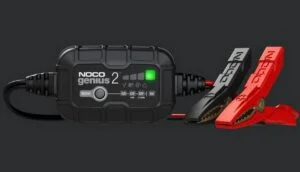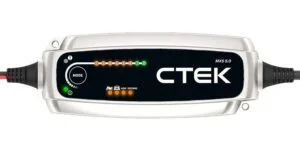A vehicle ignition system relies on the battery and alternator to function. The battery starts your car and also supplies power to electrical systems as you drive. Your alternator then supplies a continuous charge to the battery to replace the energy used.
If your alternator goes bad, your battery will not be recharged as you drive along. Eventually, your vehicle will stop, as the battery finally gives up. But how long does it take to get to that condition?
How Long Will a Battery Last With a Bad Alternator?
There are many factors affecting how long a battery will last when the alternator isn’t charging it. The type of engine, how modern the car is, the number of electronic systems in the car.
If it is dark and you need to use the headlights, then the battery will become flat much quicker. Plus, of course, the condition of the battery. If it’s old and nearing the end of its life, it won’t last as long as a new battery.
Estimating the time a battery will last is very difficult. There are so many factors involved. The two-vehicle types described below may help you:
Classic Diesel Car
Older diesel cars have much simpler engineering. The engine will probably drive the fuel pump, and there are no spark plugs. The engine will also drive the hydraulic pump for the power steering.
In theory, once started, a diesel engine can run until the fuel runs out. However, in practice, there will be some equipment that needs an electrical supply. The battery will last several hours easily.
Gasoline-Powered Car
In a modern petrol car, the engine is very closely controlled by electronic systems. Unlike diesel, a petrol car has spark plugs that will be a large drain on the battery. The engine management system will be the next big draw of power. Plus, there are ABS systems, airbag systems, and much more.
In this situation, the battery could last as little as 30 minutes. If you are lucky and could get up to two hours.
Note: In case you have to start the car without an alternator, don’t turn off the engine once you’re going. Starting the car flattens the battery down quickly. Starting a car uses ten times more juice than everything else put together. Headlights are the next biggest drain, so don’t turn them on unless you have to.
Bad Alternator vs. Bad Battery
The first thing you need to do is work out if it’s the battery or the alternator at fault. Without test equipment, this can be difficult. However, we talk through some common signs in the paragraphs below.
Signs Of A Bad Battery
A car that takes longer to start than normal may indicate that the battery is low on charge. If you simply hear a “click” when you turn the ignition key, the battery could be is flat.
If the battery is not charging, it could be a number of issues:
- Corroded posts. Check the battery posts for corrosion, wear, or loose connection. Use a wrench to disconnect the battery cables, clean the posts, and reconnect them correctly. It may help to connect them in a slightly different position.
- The battery is not holding its charge. If you have an older battery, say four or five years old, it may be getting past its best. There are many factors affecting battery life. Remove the battery from the vehicle, and recharge it using a quality maintenance battery charger. Refit your battery and if the same problem occurs, it is likely that your battery needs to be replaced.
Signs Of A Bad Alternator
All cars feature an electrical system warning light on the dashboard. The most common reason for the warning light coming on is a bad alternator.
There are many indications that your alternator is not working correctly:
- If your car starts easily, but the warning light comes on straight away, it is most likely the alternator.
- Modern cars will automatically shut down non-essential equipment such as air conditioning, ABS, and even the airbags. This is to ensure as much power as possible goes into running the engine. If this is happening and the warning light is on, suspect the alternator.
- If you are driving at night, your headlights may be dim if the alternator is not working.
- Anything odd, such as flickering dashboard lights, or your speedometer and tachometers stop working.
What Causes An Alternator To Go Bad?
The alternator is a fairly simple part of the car, with only a few moving parts. It is a simple electromagnetic system, but it can be damaged by dust and dirt build-up. There are also bearings that can fail. Below are some causes of a failing alternator:
- An overtight alternator belt will very quickly ruin the alternator bearings. Make sure they check your drive belt tensioner during regular servicing.
- Dirt, dust, and oil in the electrical windings can prevent the alternator from operating at optimum levels.
5 Tips For Longer Driving With A Bad Alternator
The alternator’s function is to recharge the battery and power the electrical systems. So keeping your battery in top condition is the aim here:
- When you start your car, use either a jump-start booster or another car battery.
- When you’re driving, don’t use lights, radio, fan, power window, anything that works via electricity.
- Fully charge your car battery with a trickle charger as often as you can.
- The faster you’re going, the further you can go in a given amount of time. Obviously, this is not an excuse to break the speed limit!
- Swap all the bulbs for LEDs for less electrical consumption.
Find purchasing options for Jump Starter online:

Noco GB40

GOOLOO GT1500

Clore Automotive JNC660
Conclusion
How long your battery will last when the alternator has gone bad will vary for many reasons. If you carry on driving your car with a bad alternator, you will have to charge your battery regularly.
For the health of your battery and car, replace the alternator as soon as possible once it has failed.
See Trickle Charger to regularly charge your car battery here:

NOCO GENIUS2

CTEK MXS 5.0
FAQs
Can a bad alternator kill a new battery?
Yes, very easily. A failing alternator can overcharge, which will damage the battery. An undercharging alternator will leave the battery flat, which speeds up its failure.
How much does it cost to fix an alternator?
Changing an alternator is a relatively straightforward job. The cost of the alternator and the time taken differs between car models. Expect to pay at least $200 and maybe up to $800 depending on the car.
How long does it take to fix the alternator?
This depends on the car and how difficult the job is. But in most cases, between an hour and three hours.
How long does the alternator last?
Most alternators will last between five and ten years, depending on the conditions they operate under.
